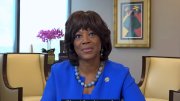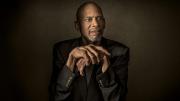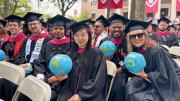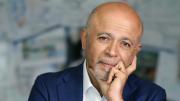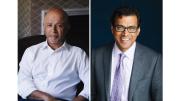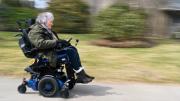Thank you for that kind introduction. And thank you to the Harvard medical and dental class of 2021 for inviting me to be your Class Day speaker this year. I am deeply honored that you chose me, particularly at this time in history. A time that has seen the devastation of a global pandemic on the lives of millions of people. Yet, we have also witnessed the incredible heroic response by members of the medical professions and the scientific community that have inspired all of us. So, it is humbling for me to have the opportunity to join you today as you begin your careers in a health care system that has been forever changed by a once-in-a-century worldwide healthcare crisis.
Having said this, I have to admit that when Dr. Daley asked me to speak, I was thrilled as any alumnus would be to return to their alma mater to speak to a graduating class. I immediately started to think about my own Class Day in 1987, and all the various experiences at Harvard that led to that moment. Now, I imagine that most of you were not around in 1987; so, I feel it’s important that I go back in time and start my address with the reflections of a young—much younger—Valerie Montgomery, who came to Boston in the summer of 1982 to participate in a health professions program aimed at increasing the number of minorities applying to medical school, and then matriculating as a medical student in the fall of 1983.
I grew up in Macon, Georgia, a mid-sized city about an hour south of Atlanta. So, when I first arrived in Boston there were many things that were foreign to me, like snow and riding the subway. It was both a cultural shock and an enlightenment. I remember being so impressed with the breadth of museums and artistic events in the city.
Yet, it was all so very different than what I experienced growing up in Georgia. To say the least, I was out of my comfort zone during my time here. But I enjoyed learning what would be life lessons from the experience. Like a lot of lessons we learn, they occurred in small, but instructive moments.
For example, I remember at one point during my years here, a professor changed the date for a major exam and one of my more-obviously-privileged-than-I classmates was upset because he could not go to Augusta. Growing up in Macon, Georgia. I also spent summers with my grandmother in Wrens, Georgia, not far from Augusta. In my mind there was nothing special about Augusta. So, I asked “why do you want to go to Augusta?” He replied, “the Masters,” and immediately in my mind I questioned “master for what? Is he studying to get a master’s?”
While I stood confused as to why he was upset about a trip to Augusta, he was similarly confused as to how someone from Georgia would not know about the Masters. What he didn’t realize was that most African Americans in Georgia, even in the 1980s, didn’t go to the Masters unless they were a caddie or a waiter, and African American spectators were not welcome there by some there in attendance.
At another point in time, I entered an elevator and asked another person to “mash” floor three, and this person turned to me and said that he wasn’t sure “mash” was a real word. Now, I can tell you in Georgia, “mash” is a real word. But it was another reminder in my early years of how little differences in perspective mean a great deal in how we all relate to each other.
If you think about it, it is not a great leap from a difference of understanding over the word “mash” to the difference in interpretations of “black lives matter” or the difference in understanding by a group of people refusing to wear a mask because of political, not health, reasons. Perspective and experience shape our world view and dictate our responses.
A simple change of words—“mash” instead of “press,” or perhaps the phrase “three, please.” A simple change of words created a difference between me and the other person on that elevator.
The differing experience around the masters created a divide between me and my classmate. The question I continue to wrestle with, even today as I speak to you, is whether this is a perceived difference, a perceived divide. What do these experiences mean? I know many of you have similar stories, seemingly small moments that left an indelible impression because it highlighted a difference…a gap…a divide.
But there were also big moments, none more impactful than the passing of my lab partner, Marlon Sellers, a kind gentle, thoughtful, individual who endured my fear of anything that had more than four legs and crawled, which he kindly took care of for me, either in Vanderbilt Hall or as we were leaving the anatomy lab on late evenings.
I thought I wanted to be a neurosurgeon, he too had surgical interest, but advised as we were early on in our exposure, we should keep an open mind. I remembered that as I completed my third year and chose reproductive endocrinology /infertility as my subspecialty, I had to first complete a residency in Ob/Gyn. Marlon’s voice was in my ear: “Keep an open mind.”
Thank goodness for the sound advice of Dr. Alvin Pouissant and Brenda Lee, and the bedside manner of Dr. Isaac Schiff and Bob Barbieri, the patience of Drs. Dan Tulchinsky as I started research adventures. And of course my long-term mentor to this day, Dr. Ann Kieelsing, who showed me that you could be a mother, wife, scientist all at the same time, and be excellent at all three.
More than any other event, Marlon’s death brought home to me just how fragile life is and how important it is to not waste our time on Earth. While the others laid a foundation for understanding medicine and science, Marlon’s passing emphasized to me that inherent in a medical career is our individual calling to a higher purpose; what you will do everyday will have a tremendous impact on the lives of everyone in your care.
I tell you about my years at Harvard Medical School, both the little and big things, some of the people who left their imprint, because you cannot even begin to fathom how this experience will affect your career and your ability to care for your patients in the future.
It’s not just the great education you have received; it is the integration of that education with your life that will shape the lens by which you will deliver care.
And your life experiences are influenced by what is happening in the world around you, which brings me to the first of the three areas I want to talk about today: where are we at this point in time; followed by what we have learned; and finally, why it matters as you embark on your professional journeys.
Because of COVID-19, this pandemic, you are graduating at an inflection point in the history of healthcare. When we look back, we can only see a handful of Harvard Medical School graduates who had the same experience.
For example, the graduating class of 1921 started their careers shortly after the Spanish Flu pandemic. They entered a period of time that was marked by a wave of public health initiatives around the world, including the first centralized system for reporting disease in the United States.
The 1920s were also the heyday of the progressive social movement, including the fight for women to be able to vote; regulating monopolies; and applying the scientific method to other disciplines like finance, business management and even the family. Today, we are also living in time of a social reckoning and political divide.
When I came to Harvard, the country was starting to turn to a more conservative social and political viewpoint. The early ’80s followed almost two decades of more progressive social initiatives, including the Civil Rights Movement—and, being transparent, helped more African Americans attend Harvard Medical School.
I grew up during this time and it has shaped my life to not only become a medical doctor, but to focus on minority women’s health and to increase the number of African American physicians in the country through the work we do at Morehouse School of Medicine.
Today, in the United States, and many other countries around the world, we appear to be at a crossroads: will we continue to adhere to a more conservative tilt in our country and the world or move toward the trend to a more progressive posture? The direction we choose will have a resulting impact on healthcare delivery and the state of health in this country and the world.
Will we expand access to quality healthcare for all people or reduce or eliminate the Affordable Care Act? Will the majority of the country again embrace science and scientists, or decide to ignore the opinions of public health experts? Will we finally recognize that African Americans and people of color in underserved communities continue to suffer from health disparities that impact and disrupt their lives? Or will we decide that the best healthcare will go only to a select few?
As the newest generation of health care practitioners, you will have the responsibility to help determine the path we take as a country and society.
Secondly, as you decide how you will address these issues as a medical or dental professional, you will have the benefit of the lessons we have all learned because of the pandemic. Dr. King was so right when he wrote his letter in the Birmingham jail, many only quote the last sentence of the full quote on mutuality.
What he completely wrote in the Birmingham jail was:
“all this is simply to say that all life is interrelated. We are caught in an inescapable network of mutuality; tied in a single garment of destiny. Whatever affects one directly, affects all indirectly.
As long as there is poverty in this world, no man can be totally rich even if he has a billion dollars. As long as diseases are rampant and millions of people cannot expect to live more than twenty or thirty years, no man can be totally healthy, even if he just got a clean bill of health from the finest clinic in America.
Strangely enough, I can never be what I ought to be until you are what you ought to be. You can never be what you ought to be until I am what I ought to be.”
COVID-19 has taught us that the health of each person not only affects the health of every person, but, literally, can bring the world to its knees. For the past year, the pandemic has shut down life as we knew it. If we didn’t appreciate it before, we cannot ignore the fact that our individual survival is linked together in one humanity – no matter the color of our skin, our background, age, sexual orientation or other differences. Living our best, healthiest life is incumbent on making sure we all have access to quality, affordable health care.
Health equity is not just a nice thing to have; it is absolutely necessary that we provide people with what they need, when they need it in the amount they need, to reach their optimal level of health. Because every health inequity reduces the quality of life for everyone else.
The pandemic has shined a spotlight on the historic health disparities and lack of health equity faced by minority communities—inequities that were built on the historic racial injustice and systemic racism that has long been present in our country.
So, while we battled COVID-19, we also experienced a wave of social activism following the tragic killing of George Floyd last year. Unfortunately, racial and social tensions are only intensifying as we witness continued attacks on Asian Americans, increasing aggression towards undocumented immigrants, growing violence against persons in the trans community, and the unconscionable killing of black men by law enforcement and by each other.
This is the world in which you are starting your work.
So thirdly, the question is why does it matter to you? I hope your answer is that as a practitioner, and more importantly, a Harvard Medical School-educated practitioner or a Harvard Dental-educated practitioner, you have been taught to seek a higher calling. You not only want the patients you care for to be healthy and live good lives, you want all people around the world to receive quality healthcare. And you believe your job is not to just treat patients and provide care, but to improve the health and well-being of individuals, families, and communities.
From this day onward, based on who is sitting in front of you, I want you to ask yourself not what I can do to help this person or even what I should do to help this person. I want you to ask yourself: based on who is sitting in front of me, what’s possible?
And when you ask that question, consider the whole person. If you want them to walk more, do they live in a safe neighborhood where that’s possible. If you are referring them to a specific orthodontist, do they have reliable transportation to make it to the appointment. If you have access to the little-known NIH investigational drug therapy for the rare disease that your patient sitting in front of you has been diagnosed to have, do you see this person in their fullest potential and offer them the opportunity to participate in the clinical trial?
As you practice medicine and provide dental care or seek the answers to our most profound questions through research, seek opportunities to serve those who don’t have your background and have a different perspective on life.
Try to understand why someone may say “mash” the elevator button and another person will say “press” the elevator button.
No matter your race, age, gender, identity or background, expand your perspective to understand the backgrounds of others, that person sitting in front of you and how knowing more about them might not only affect their current state of health, but their whole approach to health.
This is what we mean by culturally competent care. We, the providers are the ones who must constantly strive to be more competent. We can all do this by simply taking the time to dive a bit deeper into the reasons behind a patient or patient group’s proclivity for an illness.
I also urge you not to practice medicine in a void, but to engage in the whole world around you and bring that interaction into your work every day. It is easy to get lost in the science of medicine, but you have a responsibility to bring your voices to the discussion around the broader ills that impact society: racism, violence, discord.
Your voice and presence matters.
You are graduates of Harvard Medical School and Harvard School of Dental Medicine; I can assure you that your degree and the network you have through Harvard will open a lot of doors for you and afford you opportunities to advance your career.
I also know how hard you worked to reach this moment; I experienced it and I watched my daughter Jayne, a 2020 HMS grad, experience it. The long hours and sacrifices were necessary. But I ask you not to see today as just an achievement. I want you to see today as a blessing that you are going to share with those you will be privileged to care for.
If you do this, then your life’s work will be wrapped in love, and, as the famous African American, Daniel Hale Williams, said, “Anything is possible when it's done in love and everything you can do should be done in love or it will fail."
Thank you for allowing me to spend some time with you on this momentous day in your lives. The best to each of you: go forth and do good.
